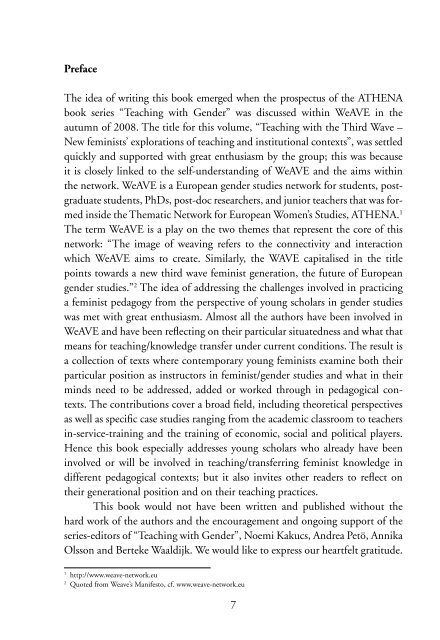Teaching with the third wave new feminists - MailChimp
Teaching with the third wave new feminists - MailChimp
Teaching with the third wave new feminists - MailChimp
Create successful ePaper yourself
Turn your PDF publications into a flip-book with our unique Google optimized e-Paper software.
PrefaceThe idea of writing this book emerged when <strong>the</strong> prospectus of <strong>the</strong> ATHENAbook series “<strong>Teaching</strong> <strong>with</strong> Gender” was discussed <strong>with</strong>in WeAVE in <strong>the</strong>autumn of 2008. The title for this volume, “<strong>Teaching</strong> <strong>with</strong> <strong>the</strong> Third Wave –New <strong>feminists</strong>’ explorations of teaching and institutional contexts”, was settledquickly and supported <strong>with</strong> great enthusiasm by <strong>the</strong> group; this was becauseit is closely linked to <strong>the</strong> self-understanding of WeAVE and <strong>the</strong> aims <strong>with</strong>in<strong>the</strong> network. WeAVE is a European gender studies network for students, postgraduatestudents, PhDs, post-doc researchers, and junior teachers that was formedinside <strong>the</strong> Thematic Network for European Women’s Studies, ATHENA. 1The term WeAVE is a play on <strong>the</strong> two <strong>the</strong>mes that represent <strong>the</strong> core of thisnetwork: “The image of weaving refers to <strong>the</strong> connectivity and interactionwhich WeAVE aims to create. Similarly, <strong>the</strong> WAVE capitalised in <strong>the</strong> titlepoints towards a <strong>new</strong> <strong>third</strong> <strong>wave</strong> feminist generation, <strong>the</strong> future of Europeangender studies.” 2 The idea of addressing <strong>the</strong> challenges involved in practicinga feminist pedagogy from <strong>the</strong> perspective of young scholars in gender studieswas met <strong>with</strong> great enthusiasm. Almost all <strong>the</strong> authors have been involved inWeAVE and have been reflecting on <strong>the</strong>ir particular situatedness and what thatmeans for teaching/knowledge transfer under current conditions. The result isa collection of texts where contemporary young <strong>feminists</strong> examine both <strong>the</strong>irparticular position as instructors in feminist/gender studies and what in <strong>the</strong>irminds need to be addressed, added or worked through in pedagogical contexts.The contributions cover a broad field, including <strong>the</strong>oretical perspectivesas well as specific case studies ranging from <strong>the</strong> academic classroom to teachersin-service-training and <strong>the</strong> training of economic, social and political players.Hence this book especially addresses young scholars who already have beeninvolved or will be involved in teaching/transferring feminist knowledge indifferent pedagogical contexts; but it also invites o<strong>the</strong>r readers to reflect on<strong>the</strong>ir generational position and on <strong>the</strong>ir teaching practices.This book would not have been written and published <strong>with</strong>out <strong>the</strong>hard work of <strong>the</strong> authors and <strong>the</strong> encouragement and ongoing support of <strong>the</strong>series-editors of “<strong>Teaching</strong> <strong>with</strong> Gender”, Noemi Kakucs, Andrea Petö, AnnikaOlsson and Berteke Waaldijk. We would like to express our heartfelt gratitude.1http://www.weave-network.eu2Quoted from Weave’s Manifesto, cf. www.weave-network.eu7
















